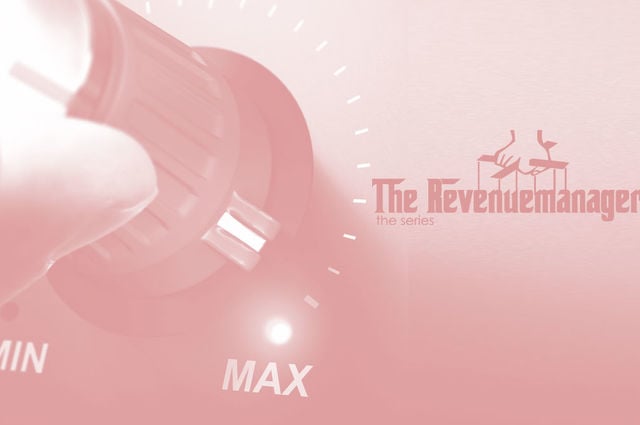Focus On Productivity: How COVID taught us to do more with less resources...
17 experts shared their view
According to the Global Travel Staffing Barometer, due to the pandemic, travel companies around the world have laid off or furloughed over half a million people, and the number of LinkedIn users in the hospitality space applying the #opentowork hashtag to their profiles grows day after day. Most hotels are struggling to run operations with skeleton crews only, yet they do not have any real alternative. In some countries, in fact, the financial help coming from governments is close to zero, so the only option for these hotels is to get rid of "superfluous" staff and try to run their businesses with a fraction of their employees. This forced most properties to heavily concentrate and focus on productivity, trying to get the best out of dire circumstances. How will this situation affect hotels? Can a global reset actually be a good thing, after all, forcing the industry to get more done with fewer resources? Or will this trend damage the guest experience in the long run?
Whether its because of labor shortages or ongoing cost cutting measures, it is clear that hospitality will struggle with labor in the upcoming months from property to corporate. This means that organizations must rethink every aspect of the business to find efficiencies, but also revenue opportunities. With the strong operations mindset in hospitality, the tendency will be to squeeze as much cost out as possible. The challenge for most organizations will be to achieve the delicate balance among cost cutting, revenue generation and maintaining the customer experience. Too much focus on any one will negatively impact the others. Technology can automate or streamline many processes that now are performed by people, both in operations and back office, many of which should not impact the guest experience at all. This means organizations need to be prepared to make technology investments in the short term that will ensure labor savings, cost savings or revenue generation in the longer term. As companies evaluate these investments, it will be important to consider three questions: how much cost can this save? how much revenue will it generate? how will it impact the guest experience? Leaving any one of these answers out will result in a negative impact to the organization in the long term.
Less staff have to take on more tasks yet more concerning: less qualified staff have to take on more complex tasks.
We shouldn't fool ourselves that "Covid taught us to do more with less resources" - we are not! The net outcome is the same, we are not doing more, we are simply re-distributing the same tasks amongst a lesser amount of people. Therefore, new hires can do new tasks as the old ones have been "absorbed".
Further: We can't look at it with a blanket approach. Some departments had the writing on the wall for years to come to either be outsourced or the ratio of "hotels per person" to be increased - natural law of selecting! Whilst housekeeping has always had outsourcing elements, now RM, Marketing, finance, reservations, etc. can easily be outsourced. Essentially all jobs that do not require face to face interactions with guests and can be done with a phone and a computer. On the other hand, some jobs will always require human intensive relationships.
We also need to understand the shift in working and the economy around it - e.g. gig or even creator economy. Through Covid we finally learned that commuting is not a badge of honour but a deterrent that takes away valuable hours in the day - not to work, but to spend with loved one! And this increased remote working more and more, and enhances productivity (and I don't mean more hours, but less hours whilst getting more done!)
Hotels not "should" but need to look at outsourcing and should embrace it - local talent is sparse, yet global talent is ripe. The benefits outshine the draw backs by miles!
Thinking about the Hospitality industry having to lay off or furlough over half a million people and talented professionals is very concerning, but as in the past crises, there will be a gradual resumption of the employment at the rebound that will affect the operational departments first. For management and back-of-the-house functions, the great lesson that this pandemic has brought is the need to review priorities to be ready for the unexpected: flexibility in tasks, transversal skills, and constant adaptation. Rigid and siloed organizations can no longer function if a hotel aspires to become efficient and successful.
Long before the pandemic broke out, there was talk of the evolution of the Revenue Manager towards what we now call the Commercial Strategist: an evolution that passes from working in silos and mono-functional departments towards an open organization with strong leadership over all the commercial areas of the hotel. This does not mean giving up roles but simply making the organization more agile and strategic: by reviewing priorities, tasks, objectives, and with a focus on the long-term strategy.
Independent hotels are frequently found by necessity in situations where one same person covers different roles and functions and oversees Revenue, Sales, Digital, and Marketing. The chains, on the other hand, are historically a little more silos-oriented with a structured and fixed hierarchy. For both, the road is paved towards a more agile organization which does not necessarily mean leaner, but more functional. The guest experience will not be damaged, on the contrary: the contamination of talents and the transversality of roles will be a great opportunity for greater knowledge, critical thinking, and improving the personalization in the guest experience through a deeper analytical approach covering (all at once) all the aspects of the guest journey.
Hospitality organizations throughout the world took drastic measures to cut down costs to survive through the pandemic crisis. As hotels open and demand returns, many are struggling to provide a consistent level of service. Hotel companies are realizing that they cannot afford to charge a fair price to their products and services if the latter is missing.
It is also true that the companies were able to get the most out of their current bench strength in these times. The question one must ask is;
- Was it efficient?
- Were employees stepping up to compensate for future furloughs?
The fact remains that companies were not strategic in their decision making as the focus was survival. Now is the time to take a step back and think of the long-term strategy and efficiencies companies want to build in the post-pandemic world.
Three words: Automation. Automation. Automation.
(And here you thought a Revenue Management expert would know how to count...)
Travel industry has been hit hard. But surprisingly, travel tech companies did relatively well in the recent year and most are still floating (except for the ones that were relying on hotel transaction fees in their business model). Why? The answer is obvious: "Do more with less" became every single hotel's motto in 2020, which paved a path to success for above-mentioned companies.
"Thanks" to the pandemic, our conservative industry has realized that technology is a friend, not a foe, so tech adoption rates are gradually climbing. And, as always, most innovative hotels that have upgraded their tech stack, will recover faster and thrive leaving everyone else behind.
So right now more than ever hotels need to rely on technology and AI. But not just any technology. One that makes you faster and more efficient without forcing you to sacrifice control over your strategy. I refer to it as controlled automation.
While I agree that COVID represents a giant reset for the industry, I'm pretty sure most of the changes were in the name of survival, not innovation. The recent rapid growth of job postings is proof that most know they cannot operate their hotels forever with the minimal resources they have been forced to rely on for the last year, nor do they intend to.
If there is lemonade to be made from COVID's “lemons only” diet, it will be in what we do next.
Imagine the tragedy of a home burning down. So long as no one is hurt, the memory will eventually fade. And the insurance check (hopefully) is an opportunity to rebuild the house, only this time with the wisdom of having lived there before. For us, the kids are gone, so one less bedroom, lots more closet space, and a man cave. For revenue leaders there are two key things to consider:
- Manpower. Should the new team be structured the same way as the one that got dismantled last year? Many of the revenue leaders I have spoken with are re-deploying with more hierarchy and specialization, instead of “jack of all trades” roles, creating more entry level positions and advancement opportunities than the previous structure. They are also re-looking at all incentive compensation to reflect the competitive times ahead, ensuring that everyone is aligned toward a common goal, no matter whether their job is to run the hotel or fill it.
- Processes. Substantial reductions in manpower caused a massive reevaluation of routine tasks, especially around reporting. Leaders no longer had the luxury of expecting time-consuming update reports, instead having to settle for the outputs directly from systems, or worse yet, learn to retrieve the information themselves. Travel demand returning will require more resources to monitor revenue tactics, but hotels must resist the urge to re-implement outdated and inefficient processes just because there is money again to pay for it.
The last two significant downturns were followed by longer periods of growth, marked by specific innovation. They brought us OTAs, then channel managers and rate shopping tools, among other things. No one knows what this recovery will ultimately be known for, but it is up to every leader to recognize the opportunity they have been granted, in the form of a clean slate, and not forget the lessons they've learned as they prepare for the better days ahead.
Every now and then I hear the expression “never waste a good crisis” which I find insensitive. We're a people's industry and many have lost their jobs having a major impact on their income and family lives. Others have found new passions in alternative industries and discovered jobs that are more lucrative and family friendly in working hours. As an industry we will have to accept that we likely lost some great talent and with them invaluable experience. I assume what one tries to say using the expression above is that the disruptive nature of a crisis is a catalyst for change and when starting from a blank canvas there is room to drastically improve processes and procedures.
Moving forward hoteliers should focus on their number one priority and passion: delighting guests. Returning with smaller teams more will need to be done with less. I would recommend evaluating all non-guest facing processes and procedures to investigate where valuable time is lost. Let's do this exercise for hotel Meetings & Events: One could consider changing to a user-centric sales & catering system so less time is wasted inputting data. Maybe an automated proposal tool? Or maybe an integrated direct booking engine? And probably a business intelligence solution that frees everyone from reporting while guiding commercial teams with data. The bonus here is that 'saving time' is often just one of the benefits of making the change meaning the positive impact will be exponential when operating in normal demand. A win-win if you'd ask me.
The current labor shortage has certainly forced hoteliers to think differently and evaluate the services we offer and how we deliver them. At Remington Hotels we have focused on three key principles to tackle this issue:
- Evaluation of services: Early in the pandemic, we focused on a number of initiatives to address the current pandemic concerns. At some locations we are utilizing Lyft for airport shuttles and we are finding that guests really like the targeted approach.
- Automation: Whether it is promoting check in through the app, mobile key, mobile restaurant menus, or different payment methods. This gives our guests more control on the process and our associates the opportunity to engage with the guest in a more meaningful way.
- Staff retention & motivation: The key to the labor shortage is not only having the right benefits to attract great talent, but also for retaining our core associates. That is why in the month of April, our senior leadership visited all of our 80 hotels to thank the associates. It gave us the opportunity to hear their thoughts, tackle any local market challenges, and review the current operating model. It was very rewarding for both the associates as well as our leadership team.
Historically our hospitality industry has been lagging on adopting new technologies given the high cost of implementation and decentralization. This current staffing shortage has forced us to be creative as to how we implement some new and existing technology a lot faster than previously expected. In the end, we will all be better off for it.
The layoff of so many workers in the hospitality has caused the loss of some brilliant minds who moved to other industries, the other to wait for new positions to open and the "survival" workers to cover more tasks and roles.
In this new scenario, the only way out is to speed up and optimize the work. For this goal 2 aspects are key:
- a smart, flexible and agile staff able to face the change and re-adapt. And to see the glass half full, this is an opportunity to grow and develop new skills
- Automation. This is not a choice anymore! It can replace all those manual, annoying and time consuming tasks for human and on the other hand optimize and personalize the sale and support to develop a right strategy. The less resources for more tasks would not be manageable without automation!
But this is not always easy to apply. In some contexts you cannot cut the service level. Let's think at the luxury, where the service level is everything. Here the open hotels had to make a choice: to reduce the own level or to keep it with an even bigger loss. An Hamletic question.
I am sure there has been a reset, but I also think that guest experience will always come first, so as soon as occupancy level will increase and a certain normality will come back, the actual approach and structure will be modified and adapted to the new conditions in order to favor the customer experience. But it would be stupid to throw out what good the pandemic has taught us: to be original creative, automated and more efficient. So some tasks have been forever replaced by technology (thanks God).
Whatever will happen, please take the good and leave the bad so that we can get out stronger.
In Q1, 2021 labor costs consumed 60%-87% of RevPAR globally (CBRE, HotelEffectiveness), making hotel operations completely unsustainable. Labor costs are increasing up to 5x faster than RevPAR (HotelEffectiveness).
The travel rebound in Q2, 2021 has added another headache for the industry - acute labor shortage. Right now, there are over 180,000 open hospitality positions on LinkedIn in the U.S. alone and to achieve same staffing levels as in Summer of 2019 the industry needs minimum 500,000 new hires.
To achieve even some semblance of hotel profitability, the ONLY way going forward is through automation, robotization and adoption of next gen technologies. I believe 5-10 years from now, hotels will operate at 50% of their 2019 staffing levels: half of humans will be replaced by robots, AI, IoT and automation.
So how do you provide service with a human touch when half of your staff will be gone? Through technology, of course!
Using AI, Automation, robotization, IoT and other next gen technologies you can still keep a “human facade” but automate all of the back-end operations, enable smart guest communications, and introduce real personalization in every touch point with the customer: from one-to-one marketing and pricing and personalized booking experience and room selection similar to choosing an airline seat, to personalized pre-arrival communications and upgrade/upsells offers, to mobile checking and contactless experience, IoT devices-enabled rooms that adjust temperature, lighting, amenities, drinks selection and entertainment options based on each guest's preferences, etc.
Yes, and add a few humans with a warm smile into the mix.
Hilton CEO Chris Nassetta said it best during a recent investor call: “The work we're doing right now in every one of our brands is about making them higher-margin businesses and creating more labor efficiencies, particularly in the areas of housekeeping, food and beverage, and other areas. When we get out of the crisis, those businesses will be higher margin and require less labor than they did pre-Covid.”
The use of intelligent technology is the most realistic lever to pull that enables hoteliers to do more with fewer resources. While simple technical automation of manual tasks in the hospitality industry is a worthwhile objective, I believe we will see the most significant gains by automating decision-making, specifically decisions of pricing, inventory management, and merchandising.
What resources are available could then be focused on serving guests and, more narrowly, on strategic objectives and analyzing how to drive the business. Hoteliers do not have the resources to invest in the mountains of daily manual tasks that existed prior to the pandemic, including balancing the house, setting offer prices, and determining what offers are compelling for which guest. This is likely not to change even as the industry recovers. The pandemic has forced us as an industry to take a step back and reevaluate how we run our businesses, including improving productivity and streamlining efficiencies.
As a result, those organizations that can leverage real-time, cloud-based Applied Artificial Intelligence that includes a domain-specific combination of machine learning, optimization algorithms, and layered with a conditions engine, will be able to realize a much higher level of precision in their revenue optimization with a far lower human cost.
The Covid-19 pandemic has hit us really hard, the hospitality sector has decreased their operations more that the 70%, so Hotel companies has been forced to adapt all their structures to that reality.
I think this pandemic has taught us a lot of things in terms of efficiency and being more focus on all the tiny aspect that sometimes we have not paid attention to.
During the last year companies has been working on trying to eliminate all this superficial task or those low probability tasks, or try to automatize all this process.
We have had time enough to achieve this kind of project that we normally could not face because our daily operations stopped us.
The use of technologies has increased a lot during the last year and companies has accelerated their digitalization and automation during the pandemic.
All that combined (Use of technologies + digitalization + automation + elimination of superficial task) will lead us to a new era of productivity.
Looking forward to discuss all this details in the Revenue Manager the Series next Thursday 20th of May.
I think one of the first things hotels need to do, especially those that are on older "closed systems" is to convert their core technology stack to the cloud. Why? Simple, once they do, they have a whole set of new services they can subscribe to that can help with automation, make things more efficient. The newer systems are also much easier to use, do admin processes much faster or have automated parts of those tasks.
The trend of doing more with less, will not go away. Guests don't mind checking themselves in our out from the hotel, buy a service through an up-sell tool on-line, in-fact, they mostly like it. So the trend of more with less should not damage guest experience, as long as hotels migrate to the new technology available to them, and make the digital interaction seamless and automated.
I feel it can actually enhance the overall guest experience further as hotel staff no longer need to be face down focused on administrative tasks, but can spend time too great and welcome the guest.
Hotels should take advantage of the Golden Age of Hotel Technology!
As the global hospitality industry begins to see pockets of recovery around the world, revenue and distribution managers are under pressure to hit the ground running to capture demand and optimize returns. Getting revenue and distribution strategies right will determine whether a hotel can bounce back or not.
Yet, beleaguered hospitality teams have a steep hill to climb. Pre-Covid many revenues and distribution managers would have told you that they were already overstretched. Fast forward to today and those who have managed to retain their jobs amid sweeping cuts are now likely to find themselves responsible for a greater number of properties with even fewer resources than in 2019.
Traditional approaches won't cut it in this new, leaner world. Hotels need to be willing to transform both their approach to revenue and distribution management and the tools they use to enable their teams to do more with less.
How can revenue and distribution managers deliver in the new normal?
Hotels have been forced to cut their workforce to the bone in order to survive. We have seen almost every one of our clients undergo a reorganization with the result being fewer revenue managers per property and throughout the chain. Many brands have combined their hotels in various ways to align them by location, tiers, or hotels that share similarities to achieve rationalizations.
As hotels 'plus up' to combine their resources, revenue and distribution managers either have fewer colleagues to support them at their individual property or are responsible for an increasing portfolio of destinations. Likewise, for the cluster managers, the pressure is on to deliver despite having fewer resources to draw on.
At such a critical time for the hospitality industry, new ways of working are needed that will give managers the time and information they need to make the right decision to safeguard their properties' future. While hotels are no stranger to managing their data digitally, most have separate systems for each task and often each property making it virtually impossible to gain a complete overview, identify risk or take decisive action.
New cloud-based solutions, designed specifically for hotels are providing real-time chain to individual property level insights. These, combined with cultural changes that support a more collaborative approach will enable teams to become more productive with the resources that they have.
Hotels must embrace digitalization
The rise of intelligent data platforms built from the ground up specifically for the hospitality industry holds the key to freeing revenue and distribution managers from hours of trawling and combining reports to get a grasp on the numbers and identify trends. With highly visualized dashboards, instant health scores benchmark performance, actions can easily be identified.
Recent years have seen dedicated hospitality platforms launched that allow managers to not only track performance by individual property but by cluster and region too. Ensuring everyone from on-the-ground employees to c-suite executives is aligned around a single source of verified data.
Better collaboration
The only way hotels will truly be able to become more productive with fewer resources is by empowering their teams to work together to drive performance. Breaking down silos must be a top priority for every organization.
Many of our clients are seeing the transformative benefits of fostering a culture of collaboration between their distribution, marketing, and revenue teams, for example. By ensuring each team can see and understand what the other is doing and how their actions impact the wider teams, savings can be found. Aligning the entire organization from the c-suite to individual property around a hub of intelligent insights with easy-to-use dashboards, more effective decisions can be made.
Faster, decision-making
Traditionally, the hospitality industry is known for its slow and steady approach. Relying on processes that have little changes of decades in the new normal teams need to be agile and act fast to capitalize on opportunities. Having a total overview and access to real-time data is central to this.
Distribution, competition, and business intelligence tools in the cloud give teams access to the information they need in an instant, and with an ability to slice and dice the data as required, the right decisions can be made at the right time.
Automated processes
Each month revenue and distribution managers waste days of their time verifying data and compiling and merging financial reports. A recent report by HSMAI found that revenue managers spend less than half their time on a revenue-generating activity. Business intelligence tools, which combine the latest machine learning and artificial intelligence are shrinking that time to a few clicks or less. Automating pick-up reports, for example, frees up time to focus on strategic issues. In addition, since they are cloud-enabled, the solutions can be easily implemented throughout the cluster or chain and any software updates are undertaken automatically.
Investing time where it matters most
Wasted time is the greatest threat to productivity. With access to clear, actionable data, revenue managers can clearly see which hotels, clusters, and chains are performing well and which require attention – enabling them to pick their battle and invest their time for optimal results.
There's no going back for the hospitality industry. Lean, productive teams are here to stay. While that can feel daunting right now, especially for a workforce that has already been through so much, this should be seen as an opportunity to transform. Those hotel chains that are ready to embrace a new collaborative culture that leverage the benefits of digital transformation are set to unlock their teams' potential and gain a competitive advantage.
Travel demand will come back, allowing hotels to open positions and hire back staff members. The question is, what should be the post-COVID19 labor strategy? The pandemic taught hotels to do more with fewer resources and showed the importance of hospitality technologies. Does this mean that hotels should operate with minimum staff and implement robots and technological solutions at all stages of the customer journey? It's up for the debate. The universal model that will be suitable for every hotel does not exist.
These are some considerations to keep in mind:
- Hotels need to find a balance between technology and humans. The goal should never be to replace as many positions with robots as possible. Instead, technology should help free up staff members' time and re-direct it towards learning about the guests, interacting with the guests, and creating customized experiences. Emotional connection with hotel employees is a competitive advantage and the reason why guests come back to the hotel. The time spent by the hotel team to develop such connections and create personalized experiences for guests is an investment in the hotel's future.
- Technology should replace routine tedious tasks, decrease the workload and reduce the stress levels of the staff members by optimizing the processes. Bored, overworked, and stressed employees won't be able to create a pleasant guest experience. If the hotel takes good care of its staff members, they will take good care of the hotel's guests.
- It's vital to know the needs and preferences of the hotel's main segments. Different customers have different perceptions towards technology and definitions of good service. Hoteliers should find the right balance between technology and humans that will suit their guests. Digital check-in might be a great idea for the younger generation, but if most hotel guests are boomers and prefer in-person conversations, the hotel should think twice before replacing front desk staff with check-in kiosks.
It's essential to know the difference between service and hospitality. Service is a process (luggage delivered to the room). Hospitality is an attitude (courteous, smiling, welcoming, and caring staff member). Technology can help optimize services, but it will never create an emotional connection. Hence, humans are and always will be at the heart of the hospitality business.
Unfortunately, COVID has been absolutely devastating for most hotels in literally every aspect of their business. This has catalyzed a global reset for the industry, and hopefully, as we begin to navigate recovery, we can draw on some of the lessons and positive changes to come out of this last year. One benefit of being forced to adapt to getting more done with fewer resources is the skillset adaptation and growth that many in the industry have undergone. This will be of huge benefit as technology and its application continue to merge across functional areas.
Smaller staff have led hoteliers to turn to technology to automate processes and operate more efficiently, and most of these guest-facing applications will enhance the guest experience. Newer processes like contactless check-in, as well as digital guest messaging and digital room service, were tools that a new generation of travelers was already seeking pre-pandemic. In some ways, the pandemic forced hoteliers to undergo a digital transformation that was severely lacking previously, and will only benefit them in the long run as the demographics of their travelers change.
My view is strongly that hospitality needs real people or it can't be hospitality. The humans need to be there to make the guest feel welcomed and taken care of. A little friendly contact goes a long way to improve guest satisfaction. For this reason I feel that technology should not replace friendly interactions.
At the same time, there are a number of jobs that don't fall into this category; where humans doing mindless tasks in place of machines is not great for anyone. Revenue management is a prime example. At RoomPriceGenie we find our customers are so happy to save a huge amount of time on pricing and actually get better results in 15 minutes a week than they used to get in 7 hours. They use this extra time doing other high-value activities, including marketing and focusing more time on their guests.
Independent hotels have traditionally been relatively slow to adopt this kind of technology, with the sector booming and labour relatively cheap. We are seeing this reset is having the effect that as hotels come out of furlough (often with less business than previously), they are trying to reduce the reliance on salaried workers.
In answer to the question, in my opinion, how well the industry comes out of this depends on how much they are able to reduce the inefficient administration but without losing (and maybe even spending more on) the vital human aspect of guest experience.



















